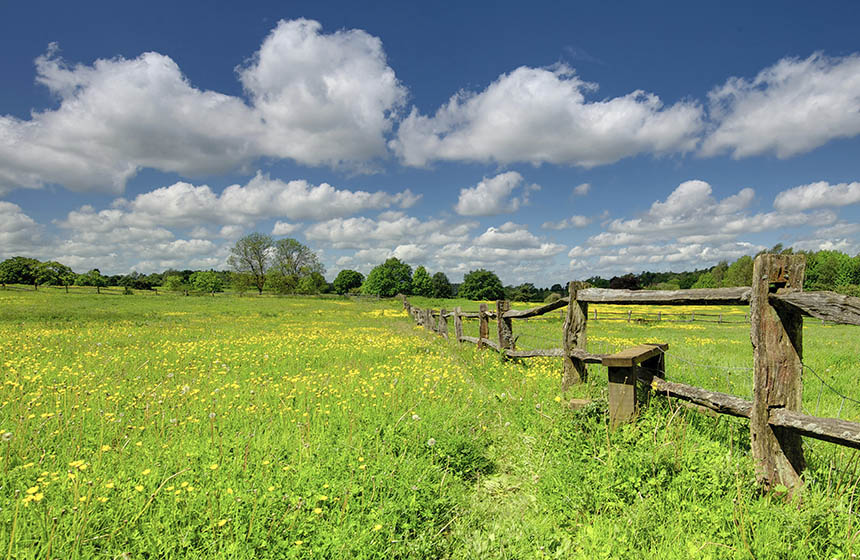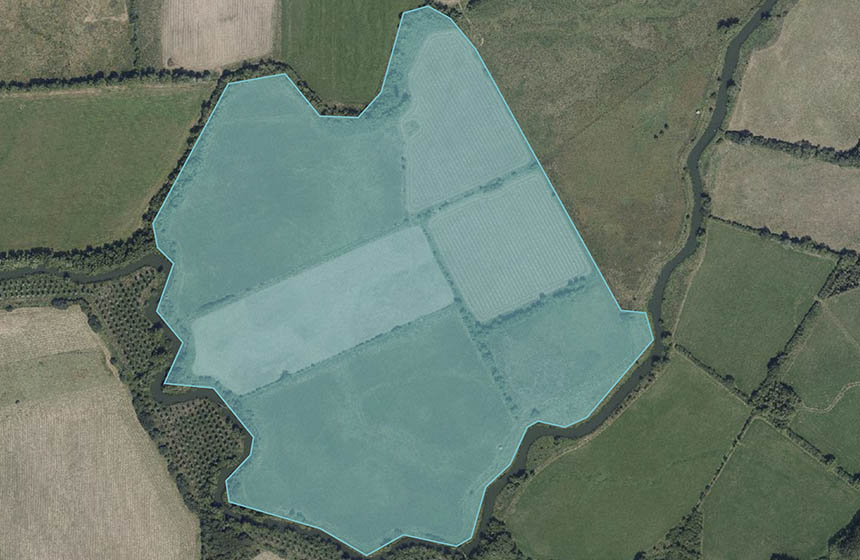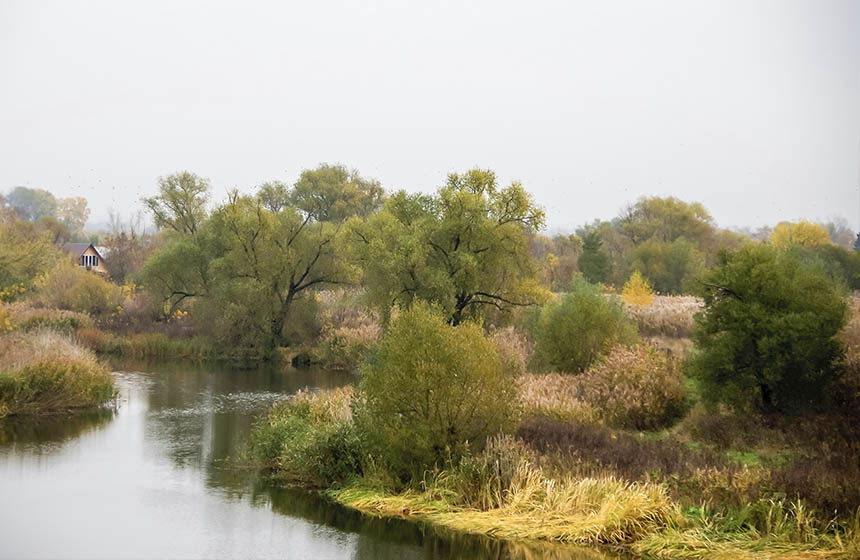Wilder Woodah: Nature recovery and carbon storage on a working livestock farm
At Woodah Farm, there are ambitious plans to scale up nature recovery alongside food production and carbon storage, acting as a demonstration centre for nature-based solutions on working livestock farms.
Nature-based intervention:
Woodah Farm, a 57 hectare site near Doddiscombleigh, was left as a legacy to the Devon Wildlife trust who took full ownership in 2009. Since then, efforts have been made to restore several parts for wildlife, whilst the area continues to operate as a working livestock farm. Initially, many tasks focused on managing hedgerows. However as time passed, the project expanded, and in 2021, Woodah Farm was selected as one of 12 high-impact initiatives committed to helping the UK achieve net-zero carbon emissions by 2050. As part of this, various management practices are being trialed and evaluated, in hopes of Woodah acting as a ‘demonstration site’ for nature-based solutions in similar areas across Devon. The core of this project is assessing how grazing levels can be reduced whilst maintaining species diversity and maximising carbon storage. Thus, from 2020 to 2021, cattle numbers were reduced from 44 to 35. Additionally, the Trust aims to promote soil recovery, restore the land’s natural processes, and enhance water availability by planting trees and expanding ponds. Exeter University collaborates with volunteers to evaluate the effectiveness of the approaches, so that other land-owners may be inspired to adopt similar practices that best suit their needs.
Overview of context:
Before being handed to the Trust, Woodah was a typical traditional Devon smallholding. The land was used for cattle and sheep grazing but had not received active management from the previous owner for an extended period. Consequently, several issues arose: the grass was over-grazed, leading to a depletion of topsoil nutrients, there was a lack of thick hedges, and the infrastructure was deteriorating. Despite encountering these challenges, the area still maintained a moderate species richness, which is characteristic of grassland habitats. Moreover, the trust had also gained ownership of Scanniclift Copse, a rich 1.8 hectare woodland adjoining the farm, creating potential for successful restoration.
Case effectiveness on
Climate change
The reduction in the number of cattle on-site from 2020 to 2021 has resulted in a reported 3% decrease in annual greenhouse gas emissions – from 423-409 tonnes. An additional outcome of this is a reported increase in above-ground carbon storage, attributed to reduced vegetation consumption and subsequent succession. Since 2015, over 2000 new native trees have reportedly been planted. Furthermore, the Trust promises to plant a total of 8000 trees in the near future which could also increase carbon storage. Additionally, much of the water system has been taken off the mains, and instead, the troughs are supplied via a gravity-fed pond, reducing overall energy consumption.
Although no climate adaptation outcomes have yet been reported since the start of the initiative, the expected improvement of soil health may enhance resilience to climate change through better moderating the impacts of floods and droughts.
Ecosystem health
Ecological effect: PositiveSince the start of the project, a noticeable change in vegetation cover within the fields has been observed: images from 2009 depict very short, closely grazed grass, while photographs from more recent years reveal significantly longer vegetation with a greater presence of scrub. Increased sightings of Meadow Brown butterflies (Maniola jurtina) have also been reported. While not yet supported by evidence, the researchers also anticipate the potential return of rarer species like Brown Hairstreak (Thecla betulae) and Grizzled Skipper butterflies (Pyrgus malvae), as well as an increase in visits by members of the endangered Horseshoe bat genus (Rhinolophidae). Detailed reports are expected to be published in the future.
Socioeconomic outcomes
While Woodah Farm has converted some farmland to nature recovery, it continues to operate as a functioning livestock farm with income-generating activities. Additionally, the Devon Wildlife Trust works to engage many volunteers on Woodah Farm, in both the implementation and monitoring of nature-based solutions. According to project reports, 18 volunteers have dedicated a total of 130 hours to the project, and there are ambitions to promote the farm as a centre for learning about nature-based solutions.
Governance
Local participation in Governance: PassiveThe Devon Wildlife Trust owns and manages the site. They oversee the operation of the farm, and work in collaboration with Exeter University and volunteers to research and identify land management practices with the best environmental outcomes.
Finance
Upon initial acquisition of the farm, the Devon Wildlife Trust received a £4,930 grant from the Pennon Environment Fund. This money was spent on laying and trimming the hedgerows which were previously neglected. The majority of the project however was supported by a grant of £69,000 from the Postcode Planet Trust, funded by players of the People’s Postcode Lottery. Personal and corporate donations to the trust are also listed as funding sources.
Monitoring and evaluation
Students and staff at the university of Exeter are working in collaboration with the Devon Wildlife Trust, to monitor and evaluate the success of methods being trialled within the farm. Although no progress reports have yet been published, they have taken various baseline measurements that will be useful for comparison with future data. One branch of their work focuses on soil recovery: 23 grassland and 7 woodland surveys have been gathered to assess soil structure, nutrient concentrations and carbon storage. As well as this, detailed aerial drone survey work is being undertaken so that larger-scale vegetation changes can be monitored. By capturing thousands of photographs and stitching them together with a 70% overlap, they have achieved a resolution of 5cm pixels. Additionally, volunteers from Devon Biodiversity Record centre have been trained on moth trapping, butterfly transects and dormouse surveys. Collating all of this information and tracking changes will help inform future management practices within Woodah Farm and elsewhere.
Trade-offs and limitations
As Woodah Farm has returned some of its pasture land to more natural processes and has reduced its herd size, it is likely that there are tradeoffs between rewilding and food production.
References
- Devon Wildlife Trust. N.d. Wilder Woodah. https://www.devonwildlifetrust.org/wilder-woodah
- One Magazine. 2023. 15 Minutes With… Devon Wildlife Trust’s Woodah Farm. https://www.one-mag.co.uk/15-minutes-with-devon-wildlife-trusts-woodah-farm/
- BBC. 2021. Wildlife Trusts habitat projects aim to tackle climate crisis. https://www.bbc.co.uk/news/uk-england-57756586
- Devon Climate Emergency. N.d. Woodah: Devon’s ‘Wilder Farm’ https://devonclimateemergency.org.uk/taking-action-old/woodah-devons-wilder-farm/
- South West Farmer. 2010. Wildlife trust receives conservation funding. https://www.southwestfarmer.co.uk/news/4849282.wildlife-trust-receives-conservation-funding/
- The Wildlife Trusts. 2022. Changing Nature: A climate adaptation report by The Wildlife Trusts. https://www.suffolkwildlifetrust.org/sites/default/files/2022-07/Changing%20Nature%20Adaptation%20Report.pdf

Intervention type
- Food production
- Management
- Restoration
Ecosystem type
- Temperate forests
- Terrestrial production
Instigators
- Local NGO or CBO (eg. indigenous)
Societal challenges
- Biodiversity conservation
- Climate change mitigation
Outcomes
- Food security: Unclear
- Water security: Not reported
- Health: Not reported
- Local economics: Not reported
- Livelihoods/goods/basic needs: Not reported
- Energy security: Not reported
- Disaster risk reduction: Not reported
- Rights/empowerment/equality: Not reported
- Recreation: Positive
- Education: Positive
- Conflict and security: Unclear
- No. developmental outcomes reported: 5
Resources
Read resource 1Read resource 2
Read resource 3
Read resource 4
Literature info
- Grey literature




